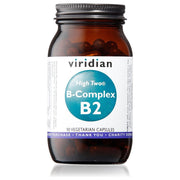100,000+ Orders Shipped
Call us free: 0800 098 8888
Family Run 40 Years +
Money Back Guarantee
Vitamin B2 (Riboflavin)
Can’t find what you are looking for? Contact Us and we will look to get it for you (at a great price and no delivery charge). If you are the first person to suggest a new product to us that we start to keep in stock, we’ll even send you one for free!
Riboflavin, otherwise known as Vitamin B2, is found in the food we consume, and it is even included as an added supplement. While microorganisms that live in the gut do make supoplies of riboflavin, it's not enough to sufficently meet dietary needs. This particular vitamin is a fundamental part of coenzyme gatherings that endorse cell development and energy production while processing fat, steroids and drugs. The body does not store riboflavin; thus extra amounts are released through the urine. When large dosages of riboflavin are consumed via supplements for an extended period time, this may cause urine to have a yellow hue.
Recommended Amounts
For adults aged 19 and over, men should have an RDA of 1.3 mg daily, while women should take in 1.1 mg. If a woman is pregnant or lactating, the RDA raises to 1.4 mg and 1.6 mg respectively.
There is no Tolerable Upper Intake Level (UL) for riboflavin, as it has not been identified as a potential health risk from consumption of food sources or long-term use of high-dose supplements.
Food Sources
Riboflavin is found mostly in meat and fortified foods but also in some nuts and green vegetables.
- Dairy milk
- Yogurt
- Cheese
- Eggs
- Lean beef and pork
- Organ meats (beef liver)
- Chicken breast
- Salmon
- Fortified cereal and bread
- Almonds
- Spinach
Signs of Deficiency and Toxicity
In the United States, a lack of riboflavin is incredibly scarce. If there is an issue with the thyroid gland, then the chances of a deficiency increase. Generally speaking, people who are lacking in other vitamins will also be deficient in riboflavin. Signs that this may be the case include:
- Cracked lips
- Sore throat
- Swelling of the mouth and throat
- Swollen tongue (glossitis)
- Hair loss
- Skin rash
- Anemia
- Itchy red eyes
- Cataracts in severe cases
- Groups at higher risk of deficiency:
Vegans and vegetarians typically reduce or eliminate their consumption of dairy and meat products.
Women who are expecting typically require more nutrients, and those with lactose intolerance or limited access to meat may be especially at risk.



